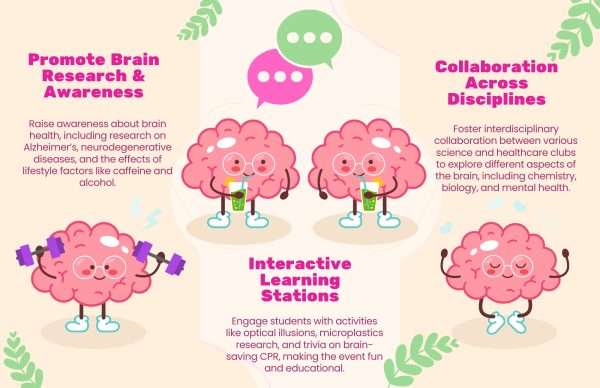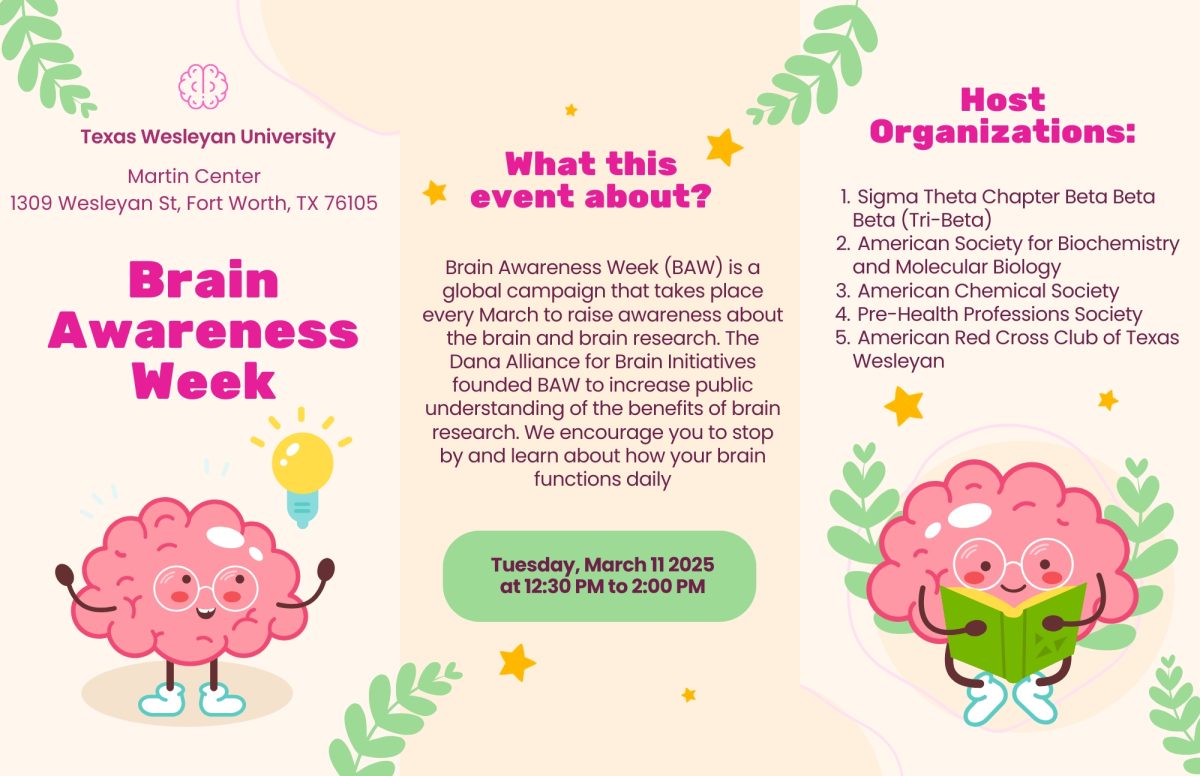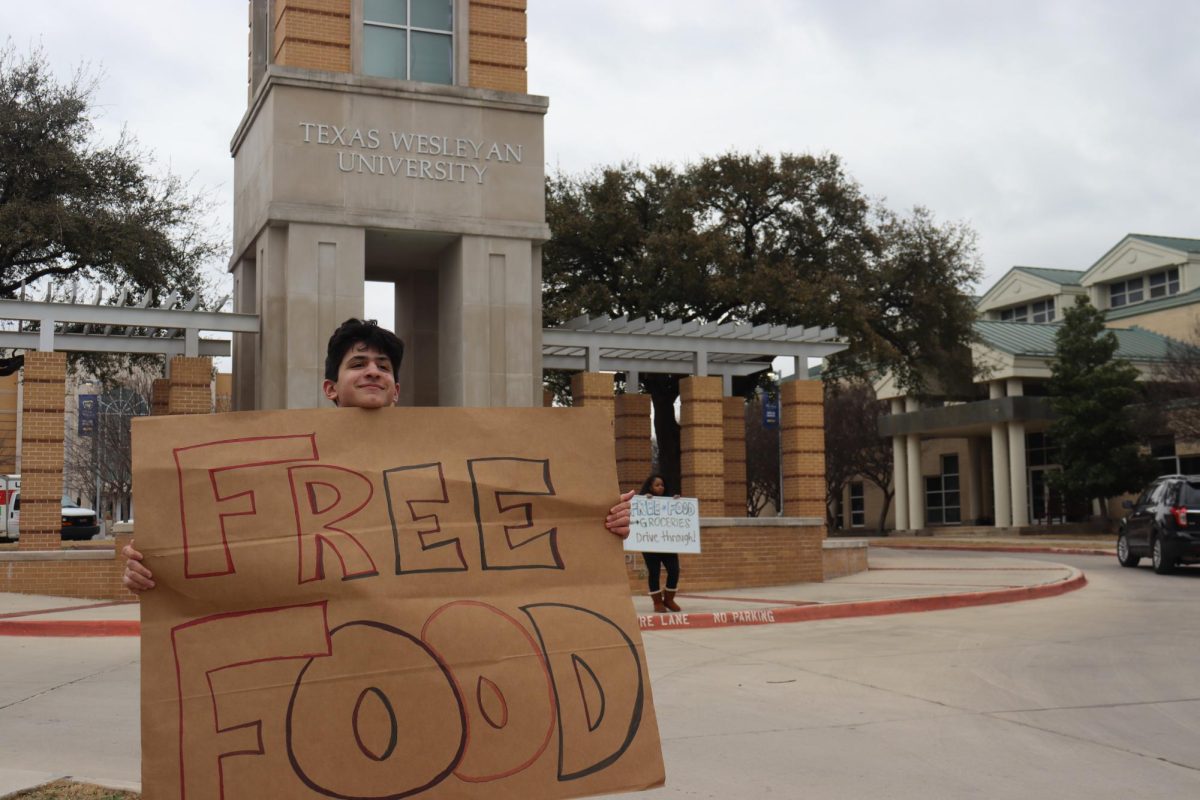Texas Wesleyan University is set to host its first-ever Brain Awareness Week, an initiative designed to educate students on brain health, neuroscience research and mental wellness, event on Tuesday, March 11 in the Martin Center from 12:30-2:00 p.m.
The event, spearheaded by senior biology major and Tri-Beta President Grace Pavelka, brings together multiple science organizations on campus to offer an engaging and informative experience.
“This event is all about raising awareness of the brain and promoting brain research,” Pavelka said. “We all know we have a brain, but what do we really understand about how it works and what affects it?”
Brain Awareness Week, a global campaign to foster public enthusiasm and support for brain science, was established in 1996 by the Dana Alliance for Brain Initiatives (DABI) and the European Dana Alliance for the Brain (EDAB). Held annually in March, it brings together colleges, universities, medical research institutions, and advocacy groups worldwide to promote brain research and education.
Brain Awareness Week at Texas Wesleyan is a student-led collaboration featuring various science organizations, including Tri-Beta, the American Society for Biochemistry and Molecular Biology (ASBMB), the American Chemical Society (ACS), the Pre-Health Profession Society and the Red Cross Club. Each organization will host interactive booths with activities that highlight different aspects of neuroscience and brain health.
Tri-Beta will present optical illusion experiments, such as the Stroop test, to demonstrate how the brain processes visual information. The ASBMB booth, led by President Emily Ochoa, Vice President Jovany Morales, and Secretary Hue Chi Mai, will feature a neuroscience-themed card game with prizes, helping students learn about neurological diseases in a fun and engaging way.
“Our goal is to make learning about brain disorders more interactive and accessible,” Ochoa said. “By engaging with students through games, we hope to spark interest in neuroscience and biochemistry.”
The event also hopes to emphasize mental health and its connection to neuroscience.
“We want students to understand the biochemical processes behind brain function and how they influence overall mental health,” Mai said.
A multidisciplinary endeavor, Brain Awareness Week will educate students on the link between psychology and our brain functions.
“Our table focuses on connecting brain chemistry with human behavior,” said ASBMB faculty advisor Dr. Khalid Shaikh. “It’s fascinating to see how molecules and chemical messengers regulate our emotions, cognition, and neurological functions.”
Morales added to the importance of this event to students.
“We want students to see how biochemistry plays a role in everything from mood regulation to neurodegenerative diseases.”
The American Chemical Society will host an exhibit on the effects of caffeine, alcohol, and other substances on brain function.
“Many students rely on caffeine or even take study drugs to enhance focus,” ACS President Roberto Nunez said. “We want to highlight the impact these substances have on the brain and encourage students to take care of their mental and physical health.”

The Red Cross Club, co-led by Emily Lewis, will focus on the importance of CPR in preventing brain damage, emphasizing how quick response times can minimize long-term cognitive effects.
“Our goal is to spread awareness about CPR and how it can help reduce damage to the brain the faster it is initiated,” Lewis said.
The event was born out of Pavelka’s desire to bring an educational yet interactive experience to the campus community.
“I was looking for ways to make science more accessible and engaging,” she said. “I found out that Brain Awareness Week is a national event, but we had never done something like this at Texas Wesleyan. I reached out to other science clubs, and together we made it happen.”
Dr. Shaikh, who has a personal connection to brain health due to his experience with migraines and hearing loss, emphasized the significance of brain research.
“The brain is incredibly complex, and there’s still so much we don’t know,” he said. “Events like this help students recognize the role of neuroscience in everyday life.”
Pavelka and other organizers hope Brain Awareness Week will become an annual tradition at Texas Wesleyan, growing to include more student organizations and broader discussions on mental health.
“In the future, we’d love to incorporate psychology, athletic training, and even business clubs,” Pavelka said. “Understanding the brain isn’t just for science majors—it’s for everyone.”
Students and faculty are encouraged to attend the event, participate in interactive activities, and learn about brain health in a dynamic environment. Brain Awareness Week will take place on March 11 in the heart of campus, with booths set up throughout the day to engage students between classes.
“We just want people to walk away having learned at least one new thing about their brain,” Pavelka said. “If they do that, then we’ve accomplished our goal.”









![Pippin, played by Hunter Heart, leads a musical number in the second act of the musical. [Photo courtesy Kris Ikejiri]](https://therambler.org/wp-content/uploads/2025/04/Pippin-Review-1200x800.jpg)
![Harriet and Warren, played by Trinity Chenault and Trent Cole, embrace in a hug [Photo courtesy Lauren Hunt]](https://therambler.org/wp-content/uploads/2025/02/lettersfromthelibrary_01-1200x800.jpg)
![Samantha Barragan celebrates following victory in a bout. [Photo courtesy Tu Pha]](https://therambler.org/wp-content/uploads/2025/05/20250504_164435000_iOS-834x1200.jpg)





![Hunter Heart (center), the play's lead, rehearses a scene alongside other student actors. [Photo courtesy Jacob Sanchez]](https://therambler.org/wp-content/uploads/2025/04/thumbnail_IMG_8412-1200x816.jpg)
![Student actors rehearse for Pippin, Theatre Wesleyan's upcoming musical. [Photo courtesy Jacob Rivera-Sanchez]](https://therambler.org/wp-content/uploads/2025/04/Pippin-Preview-1200x739.jpg)
![[Photo courtesy Brooklyn Rowe]](https://therambler.org/wp-content/uploads/2025/05/CMYK_Shaiza_4227-1080x1200.jpg)

![Lady Rams softball wraps up weekend against Nelson Lions with a victory [6 – 1]](https://therambler.org/wp-content/uploads/2025/04/Screenshot-2025-04-04-100924-1200x647.png)






















![Rambler staff pose following the Texas Intercollegiate Press Association Convention award breakfast. [Photo courtesy Dr. Jenny Dean]](https://therambler.org/wp-content/uploads/2025/04/IMG_2646-1200x900.jpeg)
